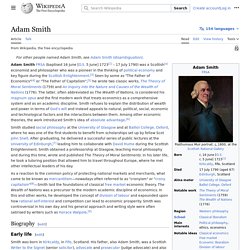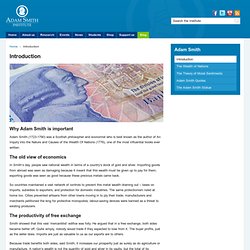

Adam Smith. 18th-century Scottish moral philosopher and political economist Adam Smith FRSA (16 June [O.S. 5 June] 1723[4] – 17 July 1790) was a Scottish economist, philosopher and author as well as a moral philosopher, a pioneer of political economy and a key figure during the Scottish Enlightenment,[5] also known as ''The Father of Economics''[6] or ''The Father of Capitalism''.[7] Smith wrote two classic works, The Theory of Moral Sentiments (1759) and An Inquiry into the Nature and Causes of the Wealth of Nations (1776).

The latter, often abbreviated as The Wealth of Nations, is considered his magnum opus and the first modern work of economics. In his work, Adam Smith introduced his theory of absolute advantage.[8] Smith studied social philosophy at the University of Glasgow and at Balliol College, Oxford, where he was one of the first students to benefit from scholarships set up by fellow Scot John Snell. Smith laid the foundations of classical free market economic theory. Biography[edit] Introduction. Why Adam Smith is important Adam Smith (1723-1790) was a Scottish philosopher and economist who is best known as the author of An Inquiry into the Nature and Causes of the Wealth Of Nations (1776), one of the most influential books ever written.

The old view of economics In Smith’s day, people saw national wealth in terms of a country’s stock of gold and silver. Importing goods from abroad was seen as damaging because it meant that this wealth must be given up to pay for them; exporting goods was seen as good because these precious metals came back. So countries maintained a vast network of controls to prevent this metal wealth draining out – taxes on imports, subsidies to exporters, and protection for domestic industries.
The productivity of free exchange Smith showed that this vast ‘mercantilist’ edifice was folly. Because trade benefits both sides, said Smith, it increases our prosperity just as surely as do agriculture or manufacture. Social order based on freedom. Squashed Philosophers - Smith - Wealth of Nations. The annual labour of every nation is the fund which supplies it with all the necessaries and conveniences of life, and which consist always either in the immediate produce of its labour, or in what is purchased with that produce from other nations.

According, therefore, as this produce bears a greater or smaller proportion to the number of those who are to consume it, the nation will be better or worse supplied. But this proportion must in every nation be regulated by two circumstances: first, by the skill, dexterity, and judgment with which its labour is applied; and, secondly, by the proportion of the people who are usefully employed.
Among the savage nations of hunters and fishers, every individual who is able to work is more or less employed in useful labour, and endeavours to provide the necessaries of life, for himself, his family or tribe. Biography of Adam Smith (1723-1790) < Biographies. Adam Smith was a Scottish political economist and philosopher.

He has become famous by his influential book The Wealth of Nations (1776). Adam Smith (1723-1790) The Big Question: Who was Adam Smith, and does he deserve to be on our banknotes? - This Britain - UK. The Governor of the Bank of England, Mervyn King, has announced that a portrait of Adam Smith will feature on a redesigned £20 banknote, to come into circulation next year.

He is said to be the first Scot to be so honoured, although he is already on the £50 note issued by the Bank of Scotland. He replaces the composer, Sir Edward Elgar, who has been the face of £20 since 1999. The note will also show a picture of a pin-making factory and summarise Smith's conclusions on the benefits of the division of labour. Are bank-notes often redesigned? Yes. So who was Adam Smith and what did he do to deserve this recognition? He was an 18th-century Scottish philosophy professor, and later customs commissioner, who is now widely regarded as the founder of modern economics. One of his central arguments was that pursuit of individual self-interest had the effect of advancing the common good - which was later interpreted by some as providing a justification for selfishness.
For two main reasons. Yes... Adam Smith. Adam Smith was born in a small village in Kirkcaldy, Scotland, where his widowed mother raised him.

At age fourteen, as was the usual practice, he entered the University of Glasgow on scholarship. He later attended Balliol College at Oxford, graduating with an extensive knowledge of European literature and an enduring contempt for English schools. He returned home, and after delivering a series of well-received lectures was made first chair of logic (1751), then chair of moral philosophy (1752), at Glasgow University. He left academia in 1764 to tutor the young duke of Buccleuch. For more than two years they traveled throughout France and into Switzerland, an experience that brought Smith into contact with his contemporaries Voltaire, Jean-Jacques Rousseau, François Quesnay, and Anne-Robert-Jacques Turgot.
Today Smith’s reputation rests on his explanation of how rational self-interest in a free-market economy leads to economic well-being. Footnotes. History - Historic Figures: Adam Smith (1723-1790) Adam Smith 1723 -1790, Scottish Philosopher - International Association for Scottish Philosophy. Adam Smith - Scottish Enlightenment. Our cookie usage We use cookies to ensure that we give you the best experience on our website.

If you continue to use this website, we'll assume that you are happy to receive these cookies. Find out more about how we use cookies. Find us on Privacy and cookies Scotlands History\|Scottish Enlightenment.